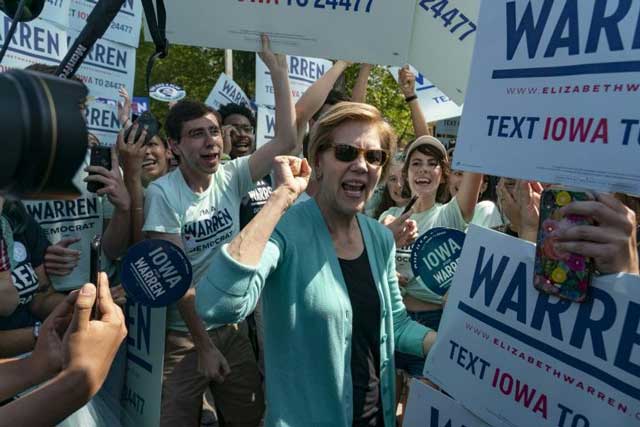
Washington, United States | AFP | At every campaign rally, Elizabeth Warren, Democratic candidate for the US presidency, waits to hear the first notes of Dolly Parton’s popular country tune “9 to 5” before striding energetically onto the stage to greet wildly enthusiastic supporters.
The musical backdrop to this age-old campaign ritual describes the daily grind of American workers: “Workin’ 9 to 5, what a way to make a livin’ / Barely gettin’ by, it’s all takin’ and no givin’.”
The senator’s song choice — others on her list include “Everyday People” and “Respect” — is anything but accidental, aimed at giving supporters an emotional lift while evoking her own working-class roots.
The 70-year-old Massachusetts progressive is competing against a field of 14 others — all of them deploying playlists at well-choreographed rallies — as they seek voters’ backing in a race to take on President Donald Trump in elections next November.
“The music employed by candidates is chosen with great care in order to appeal to certain audiences or craft an image of the candidate that resonates with the electorate,” Jacob Neiheisel, a political scientist with the University at Buffalo (New York), told AFP.
Senator Bernie Sanders, the feisty, self-declared democratic socialist who is the oldest candidate in the race, opens rallies to the militant tones of John Lennon’s “Power to the People,” an ode to protest and resistance from the 1970s. He also favors “Takin’ It to the Streets.”
And the centrist Joe Biden, who embraces the nickname “Middle-Class Joe,” regularly ends his rallies with gravelly voiced country singer Kenny Chesney (“For the teacher in the classroom, kid kickin’ cans in the street / … We say we can when they say we can’t”).
Country music may not export well but it is extremely popular in the American heartland, particularly among more conservative voters.
Biden served eight years as Barack Obama’s vice president and never misses a chance to highlight his association with the country’s first black president. He includes nearly equal numbers of black and white artists on his playlist.
And Democrat Julian Castro, the only Hispanic candidate in the primary field, strongly favors Latin music — notably by the late Mexican-American star Selena — as he reaches out to this important demographic ahead of the 2020 elections.
– Bernie and Cardi B –
Music also allows candidates to create memorable moments — a time-tested approach.
Former president Bill Clinton, a Democrat and avid jazz fan, played this card successfully: When he performed Elvis Presley’s “Heartbreak Hotel” on the saxophone in a TV talk show appearance during the 1992 campaign, voters were surprised but largely enthusiastic at this departure from the traditional gray-suited formality of presidential candidates.
Democrats generally do better among young people than their Republican opponents, and music helps them break through to the 18-to-25 crowd, a key demographic if it can be mobilized to turn out and vote.
The team of Pete Buttigieg, who at 37 is the youngest candidate in the field, created buzz with a campy video of campaign aides dancing to “High Hopes” by the group Panic! at the Disco. (An earlier version of “High Hopes,” by Frank Sinatra, was the 1960 theme song of John F. Kennedy — the nation’s youngest president.)
The Buttigieg video — with aides dancing side-to-side, performing handrolls and claps — has since been imitated many times on social media and is now seen at the Indiana mayor’s rallies.
Sanders is quick to highlight supporters from the traditionally Democratic-leaning entertainment world as he works to again mobilize young voters, as he did in 2016.
Having recently had his praises sung by Cardi B — the former striptease dancer turned rap star — the 78-year-old with unruly white hair was recently seen on Instagram, arm-in-arm with pop princess Ariana Grande, who has an impressive 168 million followers.
– Adele and Queen protest –
On the Republican side, President Donald Trump favors popular and patriotic music for his raucous rallies, like Lee Greenwood’s “God Bless the U.S.A.,” a country song from the 1980s that clearly aims to appeal to his political base.
Some choices have been controversial, however.
When Trump aides played Luciano Pavarotti’s spellbinding “Nessun Dorma” at rallies — a song meant to impart a sense of grandeur among the sea of red-hatted supporters — the late tenor’s family protested. The president’s values and Pavarotti’s, they said, were “incompatible.”
Several other artists or their heirs — the Rolling Stones for “You Can’t Always Get What You Want,” Queen for “We Are the Champions,” as well as Adele, R.E.M. and Neil Young — have protested what they say is the wrongful appropriation of their iconic tunes at Republican rallies.
 The Independent Uganda: You get the Truth we Pay the Price
The Independent Uganda: You get the Truth we Pay the Price



